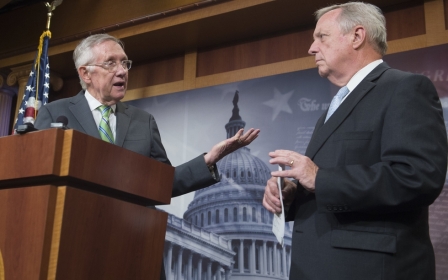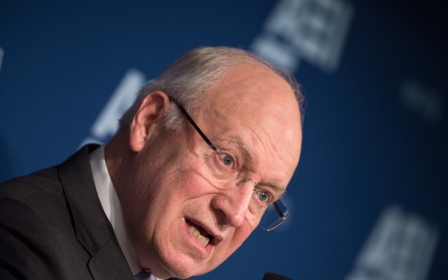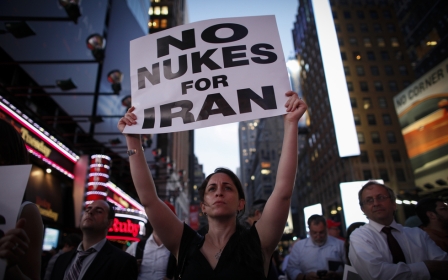After a landmark nuclear deal, what’s next for Iran?

The US Republicans’ attempt to block the Iran nuclear deal has, at long last, failed. Many analysts have taken a look at the implications of the conclusion of the Iran nuclear crisis from a variety of angles.
Some view the nuclear deal as a game-changer within Iran. They argue that ratification of the nuclear deal would be a monumental victory for the moderates, which could shift power in their favor and thus weaken the hardliners.
President Obama and his team share this view. In his interview with the Saudi Asharq al-Awsat, he argued “If we can successfully address the nuclear question and Iran begins to receive relief from some nuclear sanctions, it could lead to … more opportunity for the Iranian people, which could strengthen the hands of more moderate leaders in Iran [emphasis added].”
While this is not an invalid assessment, it does merit debate.
It does not take a sophisticated knowledge of Iranian politics to realise that radicals in Iran would also feel that the finalisation of the nuclear deal could contribute to the rise of moderates. Therefore, they would enter the battlefield with every means at their disposal to curb the moderates’ progress.
A University of Maryland study published in September shows Iranian President Hassan Rouhani’s overall approval rating at 89 percent. Only 9 percent express negative feelings toward him. These are very alarming figures for the hardliners.
On 12 September, the influential cleric Ali Saidi said: “Those who work under the banner of ‘moderates’ are more dangerous than the opposition.”
In the previous few days, Iran’s leader, Ayatollah Ali Khamenei, publicly blocked two maneuvers made by Rouhani in an effort to push back the hardliners. Contrary to Rouhani’s expressed views, Khamenei said: “I have told Mr President that parliament should not be sidelined on the nuclear deal issue,” meaning that it should vote on it. And in the second, more fundamental case, he defended the Guardian Council’s supervisory role in elections as its “legal” and “rational right”.
Implicitly referring to statements by Rouhani, he added that some objections to the role of the Guardian Council were “gratuitous”. Rouhani had previously attacked the Guardian Council’s expanding oversight of elections, particularly the vetting of the candidates of any national elections. He called on the Council to stop its involvement in filtering the candidates at its will.
One should not forget that the conservatives’ strongholds are deeply entrenched in Iran and very difficult to change hands in the foreseeable future. Among them are the Supreme Leader, the Iran Revolutionary Guards Corps (IRGC), the large paramilitary Basij militia, the police forces, the Guardian Council, and the judiciary system headed by Ayatollah Sadeq Larijani, one of the speculated candidates to succeed Ayatollah Khamenei. While Rouhani is a shrewd and informed politician, his path to bring reforms in Iran will be extremely bumpy.
Will US-Iran relations improve?
Some analysts argue that the realisation of the deal can act as a catalyst to reshape the US-Iran relations. They present their argument based on two facts.
The first is that the enmity and tension between the two states will be reduced as a result of the resolution of the decade-long nuclear dispute. The second point they make is that the deal will open the door for the two sides to put their differences aside. This would allow them to address their shared imminent security threat, ie the unprecedented rise of Sunni extremism.
However, as this author has repeatedly argued, the conservatives’ fear of normalisation of relations with the US is real and substantial. They are worried about the penetration and prevalence of American pop culture. They believe that the expansion of relations with the US could result in an explosion of tourism between the two countries and thus weaken the value system of the so called hezbollahi faction (radical conservatives) of society, who shape the backbone of the supporters of the system.
Lastly, the conservatives have also learned from Iran’s recent history that normal relations could, as Iran’s leader has clearly mentioned, facilitate the creation of covert links between the Americans and Iranians who are prepared to cooperate with them to undermine the system. As lessons, they consider the 1953 coup, orchestrated by the Americans, followed by over 35 years of regime change as the US policy of choice toward Iran.
As recently as 9 September, Iran’s leader strongly criticised those who insist on “disguising this Great Satan as the savior angel" and warned that “the Satan that the Iranian nation expelled through the door is trying to return through the window. We must not allow this to happen.”
He added: “We agreed to hold talks with the US only on the nuclear issue and for particular reasons … in other areas we did not and will not allow negotiations with US. We would negotiate and reach agreement in different levels of state, religion or ethnic groups with all countries but the Great Satan.”
Some may argue that Khamenei holds this position because he wants to maintain his stature among his conservative followers who may accuse him of compromise with, and retreat against, the US over the nuclear issue. The final Joint Comprehensive Plan of Action agreed with the US almost entirely violates the red lines drawn by Iran’s leader. But even this argument would not change the fact that the hardliners so dominate domestic politics that they force the Supreme Leader into taking such a strong position against the US.
The insurmountable obstacle in the restoration of relations between Iran and the US is not only in Tehran. In Washington, a collection of forces - the Republicans, pro-Israel Democrats and the Israel lobby - depict a mirror image of the Iranian hardliners who would fiercely block an improvement to US-Iran relations.
It suffices to listen to the 9 September speech of the Democratic presidential candidate, Hillary Clinton, which was full of tough talk on Iran. “My approach will be distrust and verify,” Clinton said. “We should anticipate that Iran will test the next president …That won't work if I am in the White House."
Clinton went on: “I know well that the same forces that threaten Israel, threaten the United States … The United States will always be with you [Israel].”
Is this speech aimed at appeasing the Israel lobby and win its support in the 2016 elections? Most likely.
However, notable in all the ups and downs since the nuclear talks began was the presence of the American Israel Public Affairs Committee relentlessly attempting to sabotage the deal. The failure of Israel’s Washington lobby to derail the nuclear negotiations and then to kill the deal by spending $30mn signifies the second major defeat the group has suffered since 2012. The first came in 2012, when AIPAC bluntly stood behind Obama’s opponent, Mitt Romney.
Many observers view the two incidents as a sign of the waning influence of AIPAC.
Considering the outcome of the 2016 US elections, observers may want to reassess the AIPAC’s influence in US politics. Will the group be able to punish those candidates who denied it in this nuclear drama?
One glaring case to be watched is the fate of the Jewish Congressman Jerrold Nadler, who represents parts of Manhattan and Brooklyn. He recently said that he was shocked by the “viciousness” of attacks against him after he supported the Iran nuclear agreement.
- Shahir Shahidsaless is a political analyst and freelance journalist writing primarily about Iranian domestic and foreign affairs. He is also the co-author of “Iran and the United States: An Insider’s View on the Failed Past and the Road to Peace”.
The views expressed in this article belong to the author and do not necessarily reflect the editorial policy of Middle East Eye.
Photo: President Hassan Rouhani addresses the UN General Assembly (AFP)
New MEE newsletter: Jerusalem Dispatch
Sign up to get the latest insights and analysis on Israel-Palestine, alongside Turkey Unpacked and other MEE newsletters
Middle East Eye delivers independent and unrivalled coverage and analysis of the Middle East, North Africa and beyond. To learn more about republishing this content and the associated fees, please fill out this form. More about MEE can be found here.





